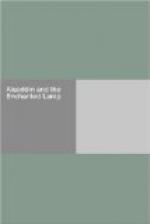From these entries it appears beyond question that Galland received from the Maronite Hanna, in the Spring and Summer of 1709, the Arabic text of the stories of Aladdin, Baba Abdalla, Sidi Nouman and Cogia Hassan Alhabbal, i.e. the whole of the tales included in his ninth and tenth volumes (with the exception of The Sleeper Awakened, of which he does not speak) and that he composed the five remaining tales contained in his eleventh and twelfth volumes (i.e. Ali Baba, Ali Cogia, The Enchanted Horse, Prince Ahmed and Pari Banou and The Two Sisters who envied their younger Sister,) upon the details thereof taken down from Hanna’s lips and by the aid of copious summaries made at the time. These entries in Galland’s diary dispose, therefore, of the question of the origin of the “interpolated” tales, with the exception (1) of The Sleeper Awakened (with which we need not, for the present, concern ourselves farther) and (2) of Nos. 1 and 2a and b, i.e. Zeyn Alasnam, Codadad and his brothers and The Princess of Deryabar (forming, with Ganem, his eighth volume), as to which Galland, as I pointed out in my terminal essay (p. 264), cautions us, in a prefatory note to his ninth volume, that these two stories form no part of the Thousand and One Nights and that they had been inserted and printed without the cognizance of the translator, who was unaware of the trick that had been played him till after the actual publication of the volume, adding that care would be taken to expunge the intrusive tales from the second edition (which, however, was never done, Galland dying before the republication and it being probably found that the stranger tales had taken too firm a hold upon public favour to be sacrificed, as originally proposed); and the invaluable Diary supplies the necessary supplemental information as to their origin. “M. Petis de la Croix,” says Galland under date of January 17, 1710, “Professor and King’s Reader of the Arabic tongue, who did me the honour to visit me this morning, was extremely surprised to see two of the Turkish [FN#18] Tales of his translation printed in the eighth volume of the 1001 Nights, which I showed him, and that this should have been done without his participation.”




